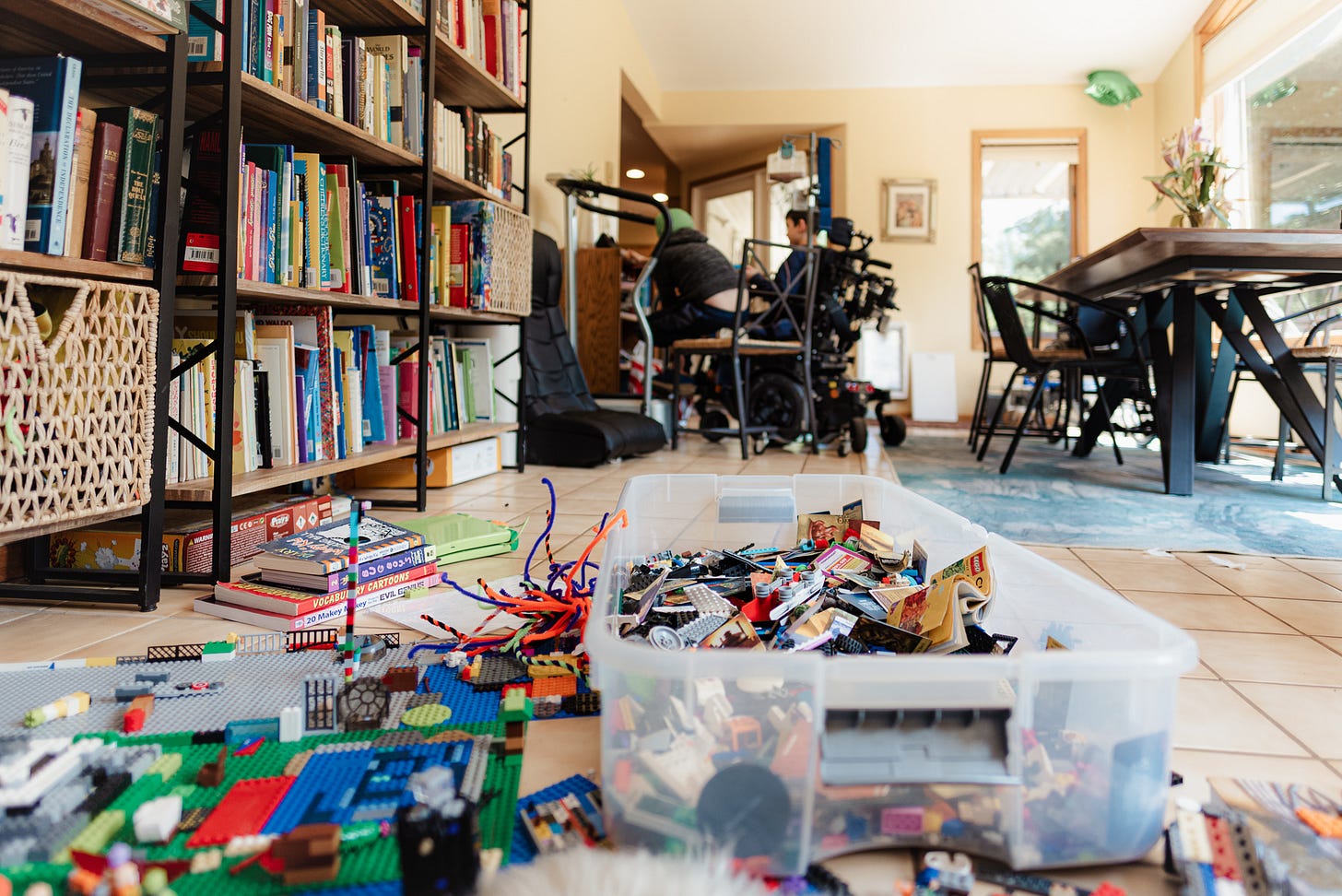“As many of us struggle with mismatched input/output capabilities, we feel out of control. We live in a world of paradoxes, a world that seems to toss us about by inexplicable forces. Our need for control doesn’t come from a desire to be one up on others. It is often a desperate attempt to manage a situation so we can function with a degree of competence. Otherwise, it’s so easy to look and feel stupid. ” — Kate Kelly and Peggy Ramundo, You Mean I’m Not Lazy Stupid or Crazy?

My brain has been going in a million directions this week.
Should I write about how I think Disney’s new movie, Encanto, is an allegory for accepting disability in a family? Or should I publish some of my findings on the institutional care industry? Or maybe in this new wave of the pandemic, we all need a break from serious topics and I should compile fun screen-free ideas for staying inside at home?
(My favorite activity with littles in the winter is a “dark party” where we turn off all the lights, get out the flashlights and dance to loud music. You know… like a rave, but with Kidz Bop.)
Before I had kids with Attention Deficit Hyperactivity Disorder, I probably would have said my indecision and scatterbrainedness meant that I was “being ADHD.” It’s one of the many ways that, growing up in the mainstream culture, I really had no idea what life was like for people with disabilities.
Even after I married a man with ADHD, I failed to examine my myths about it. It wasn’t until my twins were diagnosed, one, then the other, that I started learning what the diagnosis really meant.
Thanks in part to the app TikTok and some viral content, there is a new wave of people wondering if they have ADD or ADHD — and a resulting backlash of people wondering if it can truly be a disorder if so many people can relate. So let’s bust some common ADHD myths.
Myth #1: ADHD is not real
“To publish stories that ADHD is a fictitious disorder or merely a conflict between today’s Huckleberry Finns and their caregivers is tantamount to declaring the earth flat, the laws of gravity debatable, and the periodic table in chemistry a fraud,” wrote 80 increasingly annoyed ADHD scientists in their 2002 International Consensus Statement (p. 53). “We cannot overemphasize the point that, as a matter of science, the notion that ADHD does not exist is simply wrong. All of the major medical associations and government health agencies recognize ADHD as a genuine disorder because the scientific evidence indicating it is so overwhelming.”
Like many psychiatric disorders, ADHD suffers from invisibility. People cannot see the brain, so they don’t see, and therefore fail to acknowledge, structural differences like they do with physical disabilities. As I have a child in a wheelchair and another able-bodied but behaviorally challenged child, I have seen up close how the one with a visible disability is given graces that the other is not.
Brain scans of people with ADHD are demonstrably different and an explosion of research in the 21st century has contributed greatly to the understanding of how and why people with ADHD act the way they do. True ADHD is real, rare and probably not what you think it is.
Myth #2: Medication is a crutch
The brain mechanism that produces ADHD is difficult for me to wrap my head around, so I’ll explain it as best I can.
What we see on the outside is a child bouncing off the walls, right? One would think they need to be calmed down, given sedatives. But actually they are acting that way because their brains are desperately seeking stimulation. If you give them a stimulant to quiet that urge, they can suddenly focus and calm.
“Most neurological studies find that as a group those with ADHD have less brain electrical activity and show less reactivity to stimulation in one or more of these regions,” reads the International Consensus Statement. “And neuro-imaging studies of groups of those with ADHD also demonstrate relatively smaller areas of brain matter and less metabolic activity of this brain matter than is the case in control groups used in these studies.”
Myth #3: ‘Everyone’ has ADHD
While diagnosis of ADHD in adults and children is on the rise, it is far from ‘everyone.’ The CDC says 9.4 percent of American children have — at one point or another — received a diagnosis of ADHD. For adults, that portion is about 4.4 percent, according to the National Institute of Mental Health.
But, I have a theory as to why many aspects of ADHD are relatable.
Our world has gotten so complex. If we view ADHD more through the lens of executive dysfunction, it is easy to see how most people can experience “ADHD” symptoms sometimes. Human brains simply were not designed for the level of organization, decision-making and social interactions — the amount of executive function — that modern life considers “normal.” Throw on a global pandemic and widespread trauma, and you’ve got a lot of people operating with reduced executive function, overwhelmed by their own expectations.
But people with ADHD aren’t “fixed” by a change of environment or a simpler life. It is a core part of who they are. And, it can have devastating consequences.
People with ADHD are far more likely to drop out of school, rarely complete college, have few or no friends, underperform at work, engage in antisocial or illegal activities, including drugs. They are also more likely to experience depression and other serious co-morbid psychiatric conditions, like oppositional defiance disorder and even suicidal ideation.
Myth #4: ADHD is a deficit of attention
There isn’t a handy international consensus statement on this, but there is a lot of controversy about ADHD’s name. These doctors want the name changed to VAST — Variable Attention Stimulus Trait. That’s because while people with ADHD do seem distractable in typical school and work settings, they also have the ability to hyperfocus tirelessly for hours, forgetting even to eat or sleep in pursuit of their goal. Can that really be considered a “deficit” of attention?
My personal ah-ha moment was when I learned about executive function. Understood.org has a handy chart showing how ADHD and executive function disorder are — while not exactly the same — extremely similar.
Executive functions are things like being able to picture in your mind what a clean room looks like and planning out the steps needed to get it to that state. Or, it is inhibiting flares of emotions. Or, being flexible with schedule changes. It is also knowing what time is, how fast it is passing and how much of it you need to complete a task.
The way I describe ADHD to children is like a train — we all have a train of thought, chugging along on the track. I’ll be reading a book — totally immersed in a world of faeries and dragons — someone calls my name, and I look up. I switch tracks almost immediately. But my kids are not that way. Their train takes a lot longer to switch tracks, and sometimes it can take them so much effort to hop over to a different track as to be psychologically painful.
But the advantage?
When those trains get on a straight track with no obstacles, they can go.
Medical Motherhood’s news round up
• From NPR: “Britney Spears left her guardianship, but others who want independence remain stuck”
"We're talking about decisions about where to live, whether to get married, where to work, what medical care to receive, what to do with their money," [Indiana Disability Rights attorney Justin] Schrock said. "They really do lose all of their most fundamental basic rights."
Some guardianships are necessary, but advocates for reform argue they're overused; most of the time people with disabilities can make choices for themselves — sometimes with guidance — and should maintain that right.
"Before I entered this field, I assumed that [entering a] guardianship was a fairly innocuous step," Schrock said. "I also assumed that there were a lot of protections in place to prevent unnecessary guardianships from being established, which is absolutely not the case."
[…] In 2019, Indiana joined a handful of other states — including Delaware, Texas, Ohio and Wisconsin — in passing laws to require judges to consider less restrictive alternatives to guardianships.
Supported decision-making is one of these alternatives. Adults in these arrangements consult a support team, made up of friends, family, social workers, case managers or paid support members, about big decisions in their lives. But, unlike in a guardianship, the individual can still make the final decision.
[…] This year, in the Indiana legislature session, Dodson's organization will be advocating for additional guardianship reforms, such as requiring schools to educate parents of children with a disability on supported decision-making.
• From Newsday via Patch: “Families Receive $3 Million Settlement For Claims Teacher Abuse”
LONG BEACH, NY — Four families reached a $3.1 million settlement with the Long Beach School District regarding abuse allegations of their disabled children by a former middle school teacher and two classroom aides, Newsday reports.
The civil lawsuit, filed in 2017, outlined claims of abuse by teacher Lisa Weitzman and teaching assistants Lauren Schneider and Jeanmarie Lilley. Several high-profile members were also named, including former superintendent David Weiss, the article stated.
Documents claim the students were abused in Weitzman's class starting in the 2012-2013 school year and members of the district did not step in.
Weitzman was fired in 2019, Newsday said.
• From Teen Vogue (opinion): “CDC Director’s Comments on COVID Deaths Leave Disabled People Behind”
Sick and disabled people have reasons to leave their homes just as much as anybody else. We deserve to see our doctors and access medical care. We deserve to be able to go to the grocery store and to live our lives without fear of imminent illness and death. Sick and disabled people deserve to have our lives and deaths respected and honored. The deaths of high-risk people were never encouraging, and never will be encouraging. It was a tragedy, it is a tragedy, and will always be a tragedy that our government did not do everything in its power to protect and honor the lives of chronically ill and disabled folks.
Medical Motherhood is a weekly newsletter dedicated to the experience of raising disabled children.
Get it delivered to your inbox each Sunday morning or give a gift subscription. Subscriptions are free, with optional tiers of support. Thank you.
Follow Medical Motherhood on Facebook, Twitter or Instagram or, visit the Medical Motherhood merchandise store to get a T-shirt or mug proclaiming your status as a “medical mama” or “medical papa.”
Do you have a question about raising disabled kids that no one seems to be able to answer? Ask me and it may become a future issue.












